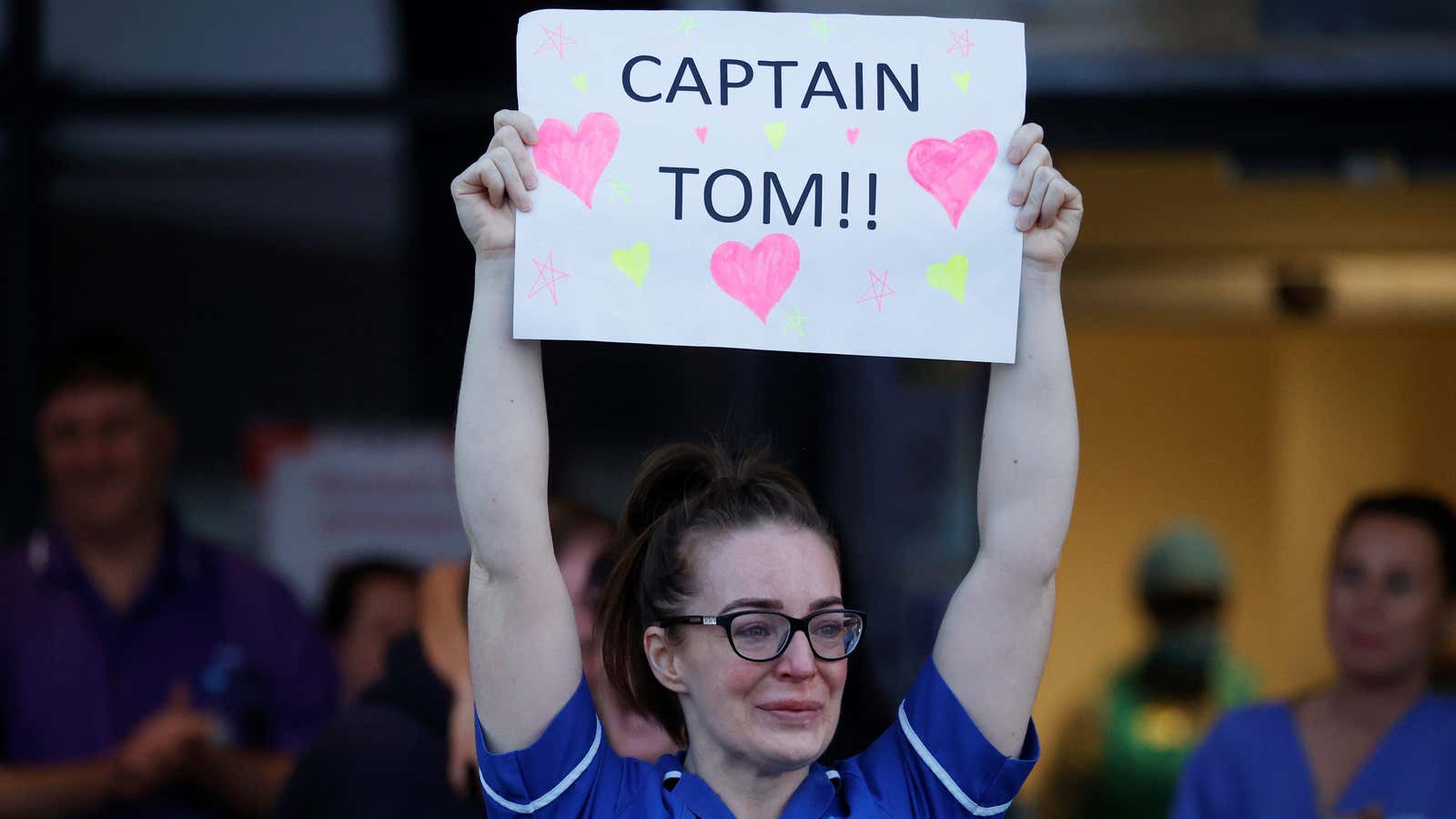Tom Moore was a captain in the British army during World War II, where he served in India and Burma. He was in his mid-twenties when the conflict ended—just another fortunate young man who’d made it out alive.
In the war’s immediate aftermath, the government made an extraordinarily important and enduring decision: to set up a national health service. Since its creation in 1948, the NHS has been at the center of British life. Elections have been won and lost on promises of improvement. And now, with the coronavirus pandemic threatening to overwhelm its staff, “protect the NHS” has become a national slogan.
Since this crisis began, millions of people in the UK have been applauding health workers every Thursday evening at 8 pm. But it’s also becoming clearer that thoughts and prayers aren’t enough, and that NHS staff need urgent help. To that end, many individual and collective efforts have sprung up to raise money and improve resources for those at the front line.
With his 100th birthday approaching, Moore (or “Captain Tom,” the semi-official title that has been bestowed upon Britain’s latest national treasure) tried to raised £1,000 for health workers by walking—with assistance—100 laps of his garden. To date, he has raised £28 million, and will receive a special award from the government, alongside his 100th birthday telegram from the queen.
It might seem strange that the NHS needs extra support from the public. Its annual budget is around £150 billion ($185 billion), nearly a fifth of all yearly UK government spending. The funds are raised by taxation and National Insurance, a form of social security that also pays for benefits like state pensions. It’s the UK’s biggest employer, too, with around 1.5 million staff. But an organization that’s designed around human frailty cannot be perfectly efficient, and has never faced anything like this.
Jack Manley, 29, is a junior doctor in the Barts Health NHS Trust’s emergency rooms in east London. He told Quartz that he and his 16,000 colleagues on the front line need decent meals to enable them to keep working hard to fight Covid-19. Breaks can be “over in a flash,” he said, and there isn’t time to visit the cafeteria, wait in line, and eat food “that can often be unhealthy.”
Manley founded DeliverAid, a nonprofit platform (created for free by a local technology company, Rehab) that enables the public to buy food for health workers, and also support the catering industry.
“With many restaurants being forced to close their doors, we as a team saw a way to support struggling food businesses, allowing them to remain active and leverage their skill and supply chains,” Manley explained to Quartz. “The healthy food they prepare is delivered directly to our frontline heroes by our dedicated volunteer network.”
Existing charitable efforts are being repurposed, just as businesses pivot from, say, gin to sanitizer. Lois Heller, 40, co-founded Lenderhand five years ago as a small organization based in Essex, eastern England. It used to mainly help vulnerable local families and individuals with daily tasks, like grocery shopping.
But now, Heller told Quartz, they’ve scaled up and broadened their base. “I run a charity and have access to resources and contacts,” she said. “What better way to use these resources than to help the NHS?”
Lenderhand now operates in London, too, including in one of Manley’s hospitals, the Royal London. It also uses donations to source and deliver food and other essential supplies, including personal protective equipment (PPE), which is in chronically short supply across the UK. Although the public showed initial enthusiasm, funding has slowed a little. “This is worrying,” Heller said. “Because it’s not clear how long this will go on for.”
Britain’s health secretary, Matt Hancock, has repeatedly made promises to workers about testing, equipment, and basic resources. But they need feeding and protecting right now, and the British public is stepping up.
